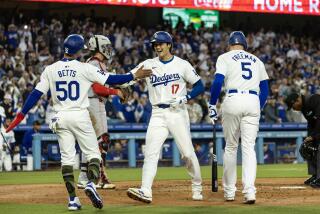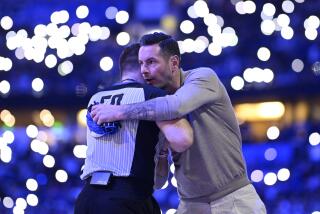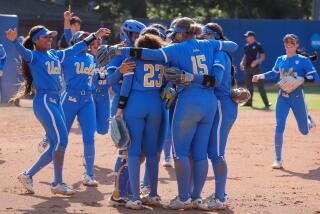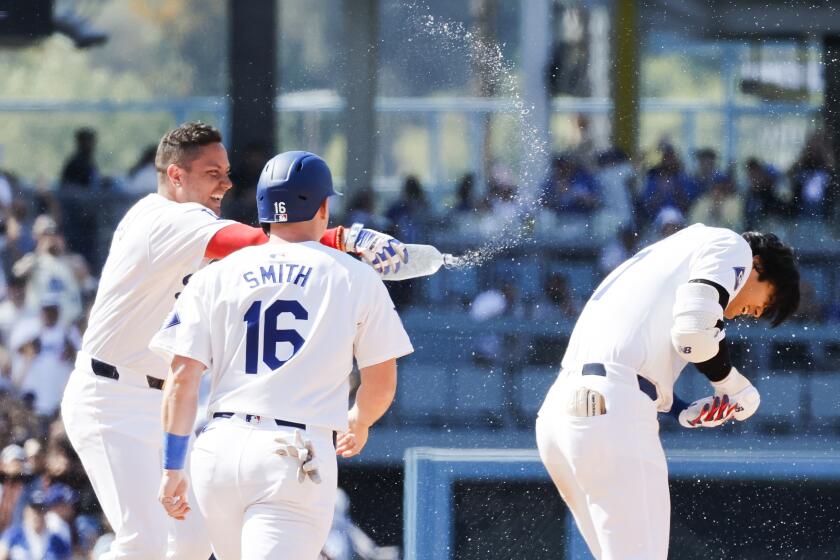League looks to counter harsh economic climate
NFL games might be broadcast in high definition, but the financial picture of the league is anything but crisp and clear.
Are teams truly concerned about their ability to pay the bills in the midst of an economic crisis, or are they merely posturing for what figures to be a nasty battle over sharing revenues with their players?
Is it poor-mouthing, or just being prudent?
It could be a little of both.
There’s no question these turbulent times have affected even the country’s richest sports league. The league has trimmed its staff by 15% and many teams have followed suit. It’s entirely conceivable that thousands of fans who might otherwise have chosen to attend games will instead watch them for free at home. And two of the premier markets, New York and Dallas, are constructing palatial, billion-dollar-plus stadiums that have yet to secure naming-rights deals.
“It’s a scary thing,” Commissioner Roger Goodell said Monday. “There’s a lot of uncertainty out there for everybody. And we’re no different from that, we’re not immune to that.”
Then, there’s the flip side. The league’s main revenue source, billions in TV money, is unchanged -- in fact, DirecTV has extended its deal through 2014, which will be enormously lucrative for the 32 clubs. Teams continue to spend with abandon on players, even while cutting employees, as the Washington Redskins did in signing defensive tackle Albert Haynesworth to a $100-million deal that guarantees him $41 million. No one appears to be losing money, although the league has steadfastly refused to open its books, a major point of contention with the union.
And, really, how bad off could the league be if the owners are holding their annual meetings this week in Dana Point at the posh St. Regis Monarch Beach, one of Southern California’s fanciest hotels? (Goodell says the location of these meetings was determined at least four years ago, so the plans were kept in place.)
The point is, in the coming months and years, as the economy slogs along and the league hammers out its next labor agreement with its players, the pocketbook realities of NFL teams will be more under scrutiny than they have been in at least two decades.
So, not surprisingly, the focus of Goodell’s state-of-the-league talk to owners Monday was the financial challenges ahead and the innovative thinking required to attack them.
It’s his belief that, especially in these difficult times, fans will flock to quality. That’s why he and others are strongly considering the concept of replacing one or two weeks of exhibition games with ones that count. That means the regular season would be increased to 17 or 18 weeks, something that would have to be agreed upon by owners, media partners and the players’ union. One plan calls for bumping the Super Bowl to Presidents Day weekend in mid-February.
Although Goodell does not expect teams to vote on a longer regular season at these meetings, he said such a vote could be called in May.
The objective?
“How can we create greater value with the content that we have?” he said. “Making it attractive, while making sure that you don’t overexpose your product is another issue. This would stay within that 20-game framework, which is still roughly two months less than any other professional league.”
There are no simple answers. A longer regular season would require more players, and Goodell raised the possibility of a developmental league at some point. Those topics, along with the concept of an NFL team returning to the Los Angeles area, run a distant second to the urgency of forging a new collective bargaining agreement.
“We’re living in a more challenging environment,” Goodell said. “It’s clear that we’re going to have to work harder, we’re going to have to be more creative, and we’re going to have to respond to our fans’ needs not only this year but going forward for some considerable time.”
--
More to Read
Get our high school sports newsletter
Prep Rally is devoted to the SoCal high school sports experience, bringing you scores, stories and a behind-the-scenes look at what makes prep sports so popular.
You may occasionally receive promotional content from the Los Angeles Times.







